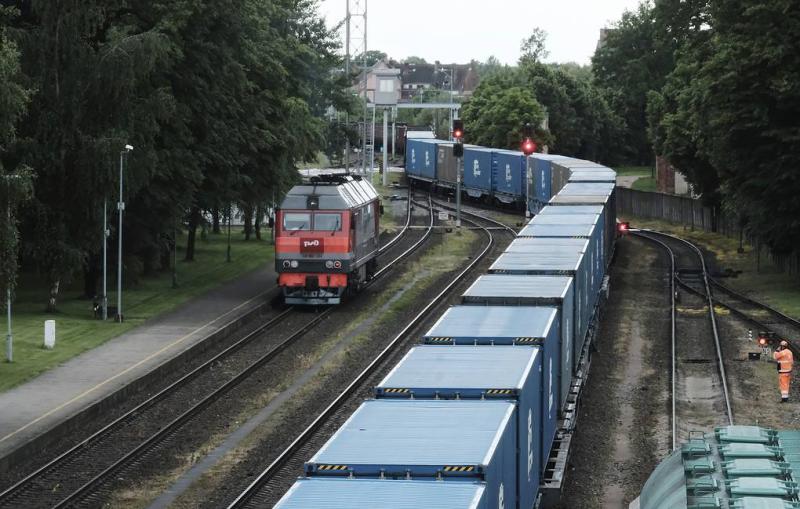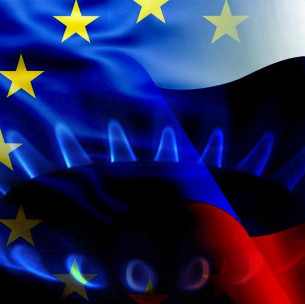
© EPA-EFE/VALDA KALNINA/TASS
Top stories from the Russian press on Wednesday, July 13th, prepared by TASS
Izvestia: EU, Russia agree on transit of goods to Kaliningrad
The EU and Russia may have agreed on the transit of goods to Kaliningrad. High-ranking sources in Russia told Izvestia that Brussels presented a document that "completely satisfied" Moscow, which indicates that restricting the movement of goods between parts of the Russian Federation is impossible. According to experts interviewed by Izvestia, this option is easier than voting on individual exceptions.
"The document states that it is impossible to restrict the movement of goods between the subjects of the Russian Federation, that is, all goods going to the region will be an exception to the sanctions lists, including both railway and road transit," an informed source told Izvestia. According to the source, Brussels and Vilnius have been trying to agree on the final document for several weeks.
The Federation Council told Izvestia that they also count on resolving the dispute, otherwise the situation threatens to descend into a "very dangerous dead end". Now everything depends on whether Brussels can persuade Vilnius, which refuses to agree on transit.
"We are optimists, we must count on the fact that common sense will prevail among our European partners and they will be able to cope with the unbridled desire of the Lithuanian leadership to show ‘courage and toughness’," Chair of the Federation Council Committee on International Affairs Grigory Karasin told Izvestia.
Another high-ranking source told the newspaper that the exceptions related to Kaliningrad are planned to be included in the seventh package of sanctions against Russia, which the EU is going to adopt in July. Including Kaliningrad transit in a separate package of sanctions would be "a reasonable decision from a procedural point of view", Director of Programs at the Russian International Affairs Council (RIAC) Ivan Timofeev believes.
Izvestia: Why Kiev shelled Novaya Kakhovka
On the night of July 12, Ukrainian armed formations attacked warehouses in the city of Novaya Kakhovka, Kherson Region. The strike was allegedly carried out using American-made HIMARS MLRS. The strike hit storage facilities with a large amount of mineral fertilizers, injuring around 90 people in the ensuing explosion and leaving at least two dead. According to military experts interviewed by Izvestia, the Ukrainian Armed Forces were able to shell civilians using NATO-supplied weapons.
"Novaya Kakhovka was attacked. However, the hydroelectric power station is now operating normally, free of any dangers. The strike was carried out with high-precision HIMARS-type weapons," Deputy Head of the local military-civilian administration Kirill Stremousov noted. Head of the military-civilian administration of Novaya Kakhovka Vladimir Leontyev called the Ukrainian strike on the city a crime against the civilian population.
According to military expert Yury Knutov, Ukraine’s attacks against the Kherson Region have several goals. "They want to create panic and destabilize the situation first. The Kherson Region, which has not sustained significant damage and is ready to join Russia, is currently under fire and is being terrorized," he explained. It is also important for Western countries to show off the effectiveness of their missile systems, and for the Kiev regime to try to boost the morale of the Ukrainian army, he added.
"The danger is not the MRLS or HIMARS multiple launch rocket systems themselves, but modern high-precision missiles that Kiev received from its allies along with them," military expert Dmitry Boltenkov told Izvestia. To counter such weapons, it is necessary to timely detect and destroy the launchers even before they have time to fire their ammunition.
Kommersant: Putin intends to meet with Turkish, Iranian presidents in Tehran
Russian President Vladimir Putin plans to visit Tehran next week, which coincides with a statement by US National Security Adviser Jake Sullivan claiming that Iran will supply a large batch of drones to Russia. The US official did not provide any evidence, but the timing of his statement was significant.
It came just before US President Joe Biden's trip to the Middle East, where he is expected to highlight preventing Tehran's regional expansion, according to Kommersant. The news that Russia may be procuring Iranian drones may be negatively perceived in the Middle East and used by Washington to undermine Moscow in the eyes of its Arab partners.
Moscow and Tehran have been actively discussing the prospects for military-technical cooperation for a long time, but so far it has been about Iran's purchase of Russian weapons, as officials in both capitals have repeatedly stated.
The meeting of the "Astana trio" in Tehran will take place a few days after Biden's Mideast tour. So it’s no coincidence that on the eve of the US presidential visit, Sullivan came out with these statements about Iranian drone supplies to Russia, according to the newspaper. "So far, Washington has failed to pit Arab countries against Moscow, but now the Americans have a new weighty argument," Kommersant writes.
"I can’t say how accurate the American data is, but in any case, the course of the hostilities in Ukraine proves once again that many, different unmanned aerial vehicles (UAVs) are needed. It would be a good idea to acquire several hundred different Iranian UAVs in a short period of time," military expert Yuri Lyamin told Kommersant. He recalled that Iran has one of the world's largest range of UAVs. "Iran, which has been under sanctions for many years, has made the production of UAVs one of its main priorities, compensating for the lack of modern combat aircraft and helicopters," the expert noted.
Nezavisimaya Gazeta: US aims to cobble together oil coalition against Moscow
There are still growing concerns over increasing oil prices despite Brent falling to $104.3 per barrel on Tuesday. The US government hopes to persuade as many countries as possible to negotiate a price cap for Russian oil and also to persuade oil producers to increase production. Experts interviewed by Nezavisimaya Gazeta question such ideas and once implemented, they would bring another price surge.
According to analysts, oil prices fell slightly on the news from China about new restrictions due to the worsening epidemiological situation. Meanwhile, US officials still believe that global oil prices could rise to $140 per barrel if Washington fails to advance its price cap bid for Russian oil. US President Joe Biden will visit Israel, the West Bank, and Saudi Arabia this week. Perhaps, the topic of oil supplies will be discussed, OPEC countries could expand oil supplies to the world market.
Experts interviewed by Nezavisimaya Gazeta believe that it will be difficult to cap the price of Russian oil. "Its buyers are numerous, scattered, and have their own interests and priorities, often in contrast to other countries. A ‘one-size fits all’ approach can result in unexpected manifestations of geopolitical problems," Chief analyst at TeleTrade Mark Goikhman told the newspaper.
Freedom Finance analyst Sergey Pigarev also doubts the possibility of revising OPEC quotas. "Parameters for increasing production quotas under the broader OPEC+ agreement have been agreed on until September. Oil producers remember that the incident between Russia and Saudi Arabia in 2020 led to a collapse in prices, so all OPEC+ countries will stick to the agreements," he noted.
Vedomosti: Nord Stream 2 claims partially recognized in European court
The Court of Justice of the European Union partially recognized claims of the Nord Stream 2 gas pipeline operator Nord Stream 2 AG in its lawsuit against the European Commission. The lawsuit was related to the amendments to the EU gas directive on regulating gas pipelines from third countries. However, according to experts interviewed by Vedomosti, this does not mean the removal of any requirements from the Nord Stream 2 project.
The release clarified that the EU Court of General Jurisdiction made a mistake in its decision of May 20, 2020, rejecting the claim about the discriminatory nature of the amendments to the Nord Stream 2 gas directive. Thus, Nord Stream 2 AG, which is currently under anti-Russian sanctions, may file a lawsuit against the directive for reconsideration.
The decision by the European Court of Justice only canceled the decision of a lower part of the EU judicial system, which saw the very claim of Nord Stream 2 AG to challenge the directive as unacceptable, Senior Partner at Pen & Paper law firm Anton Imennov told Vedomosti. "Ruling in favor of the operator is out of the question at the moment," he added.
Managing Partner at Enterprise Legal Solutions law firm Yury Fedyukin believes that Nord Stream 2 AG is unlikely to lift approval requirements from Nord Stream 2. "Even if the company receives a positive or partially positive decision, all these efforts will be in vain, since the EU is already reducing the volume of pipeline gas consumption from Russia," he told the newspaper.
Deputy Director General of the National Energy Security Fund Alexey Grivach called the EU directive discriminatory in relation to Russian oil and gas projects. However, the expert does not rule out that the mutual dependence between Russia and the EU in the gas sector can stabilize the difficult situation.









